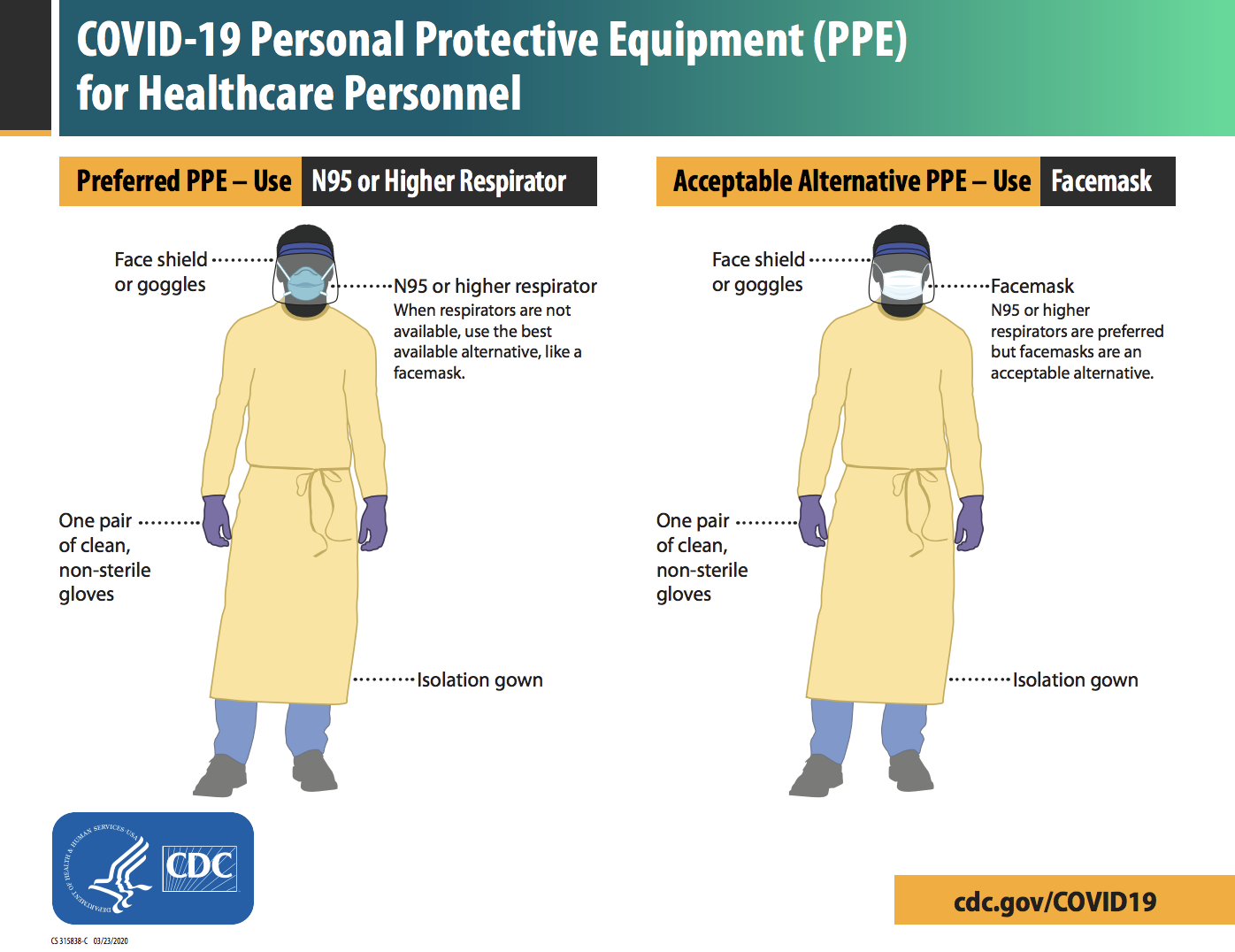2020 may be the year known for the COVID-19 pandemic, but it didn’t magically disappear with the ball drop on New Year’s Eve. Holiday travel and seasonal flu conditions are expected to increase the number of cases exponentially in the coming weeks. But just like general infection prevention and protecting yourself against the influenza virus, you can take some measure to protect yourself. Read on to know what personal protective equipment, commonly known as PPE, you should be using, how to wear and remove it, and what COVID-19 PPE your employer should be providing.
What Actually is the Coronavirus?
According to the World Health Organization (WHO), Coronavirus (COVID-19) is an infectious disease that spreads from one person to another because of the droplets that are released when a person coughs or sneezes. This particular virus can cause severe breathing and respiration problems that can lead to death. Patients that are elderly or have a weakened immune system are more prone to this fatal virus. Medically this virus belongs to the family of diseases that include Middle East Respiratory Syndrome and the Severe Respiratory Syndrome.
According to the stats provided by Worldometer, as of January 2021 there are 23,292,612 active Coronavirus patients with 23,185,046 (99.5%) of them in mild condition and 107,566 (0.5%) are in very critical condition.
Just like any other viral disease, it’s very hard not to get infected, however, some protective measures can help you against this virus.
Symptoms of COVID-19
Sometimes patients suffering from COVID-19 virus are asymptomatic, meaning not showing any symptoms until the problem gets worse. The most common are the respiratory symptoms that appear in the beginning. According to WHO, patients may experience these symptoms:
Most common symptoms of Coronavirus:
● Fever and dry cough
● The feeling of being always tired
Other less common symptoms of COVID-19:
● Red eyes
● Diarrhea
● Loss of taste or smell
● Pain in the whole body
● Constant headache
● Soreness of throat
● Congestion of nasal pass
● Skin Rash
If you are experiencing 2-3 of these most common or less common symptoms of the Coronavirus then you should seek medical attention.
How to Protect Yourself From COVID-19
According to WHO, the most effective protective measures are:
● Maintain a distance of 3 feet and avoid close contact with people. This will help you stay away from the droplets when they cough, sneeze or speak.
● Always wear a face mask whenever you go out, however, you should still avoid close contact even after wearing a face mask.
● Appropriate cleaning of reusable face masks along with storage and disposal.
● Frequently wash your hands with soap or hand-sanitizer.
● Perform basic cough etiquettes of maintaining distance before coughing or sneezing, covering your face with a tissue or your hand before coughing and sneezing. Wash your hands or sanitize them after coughing.
Wear Protective Gowns
● Clean, disposable isolation gowns should be used to cover the body.
● If the gown is soiled, it should be immediately changed and disposed off.
● Gown should be properly disposed and not just thrown away like ordinary waste.
● NEVER reuse a soiled gown.
Respiratory Protection Against Coronavirus
● Healthcare workers and nurses should NEVER use standard face masks, bandanas, or cloth face masks.
● Minimum protection for surgical masks should be fit-tested NIOSH-certified disposable N95 masks.
● Hand hygiene is a must for all; the patients, the staff, and the visitors.
● All medical environments should be routinely disinfected.
Eye Protection Against Coronavirus
● Goggles and face shields offer eye protection against the Coronavirus.
● If disposable goggles or shields are used, they should be properly disposed off before leaving the patient's room.
● The face shields should not only cover the eyes but the whole face and the sides as well.
PPE Employers Must Provide
PPE for General Employees
According to the Federal Occupational Safety and Health (FOH) Act of 1970 your employer must take measures to ensure employees safety against any viral disease in the workplace. You have the right to ask your employer about the precautionary measures he/she has taken to stop the spread of this viral disease.
The personal protective equipment provided by your employer must include
● FDA-cleared surgical and non-respirator face masks
● N95 respirators in case of any emergency
● Eye protectors and gowns (if needed)
● Heavy duty gloves (if needed)
PPE Protections for Hospitals/Health Care Employees
The personal protective equipment that should be provided by health care employers are different from general employers. In order to see and treat patients during Coronavirus the health care employers must provide the following PPE:
● Heavy duty gloves
● High efficiency air filters in the hospital
● Heavy duty eye protection
● Communication devices to ensure respiration safety
● Powered air-purifying respirator (normal respirators cannot protect against novel pathogens)
In addition, employers should also provide medical services free of charge to the exposed employees along with paid 14 day isolation precautionary leave.
Environment Infection Control
● All disposable equipment used by healthcare staff including surgical masks and other equipment should be disposed of with great care
● Equipment that is not disposable should be properly sterilized and made clean
● Consistent environmental disinfection practices should be practiced
Visitor Access and Screening Protocols Against Coronavirus
● Visitors should be properly screened for any signs of viral infection. These checks include body temperature checks, and see if they have flu or dry cough.
● Visitors should also be screened for any respiratory illnesses
● Visitors should not be allowed to enter a patient's room without proper measures
● Visitors should be provided with sanitization before letting them enter the facility
● Visitor movement within the facility should be restricted
● All doffing and donning should be performed in a separate facility
Author Bio: Bella James is a writer and editor for EuroMed Clinic Center where many medical and cosmetic services are offered.













